
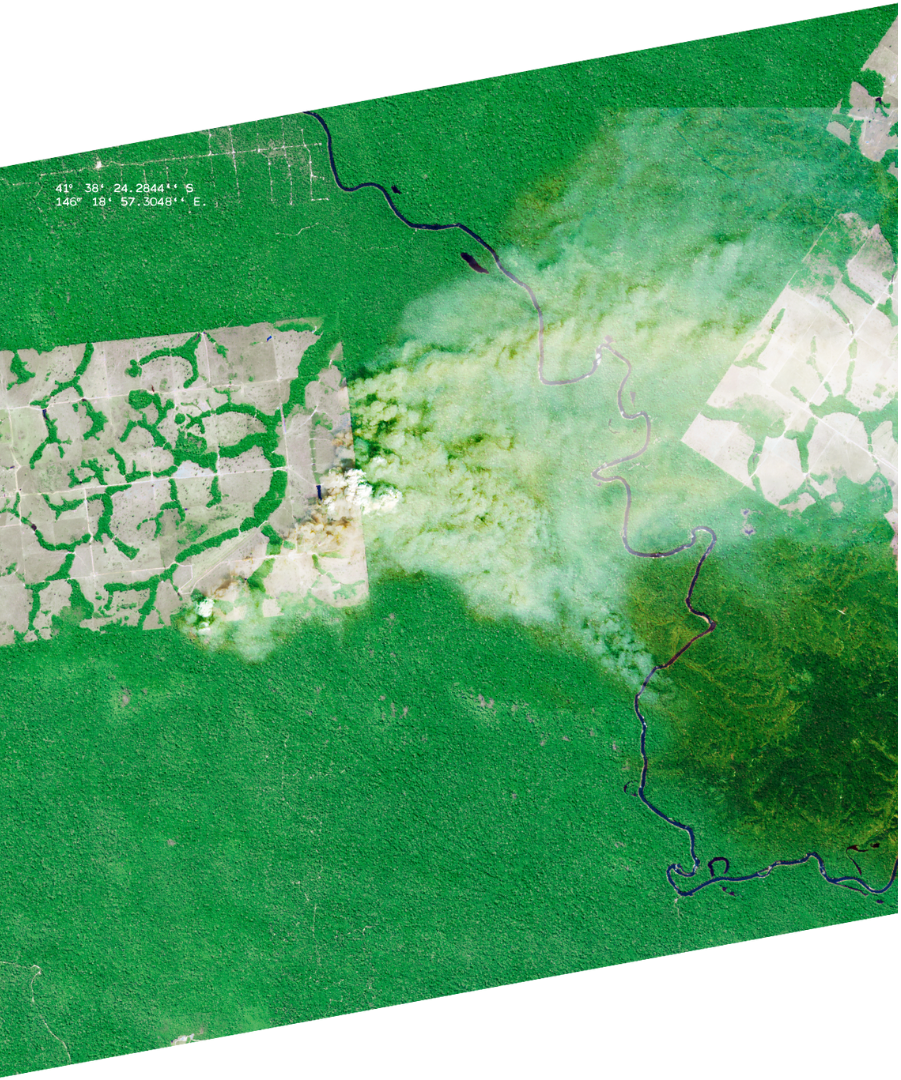




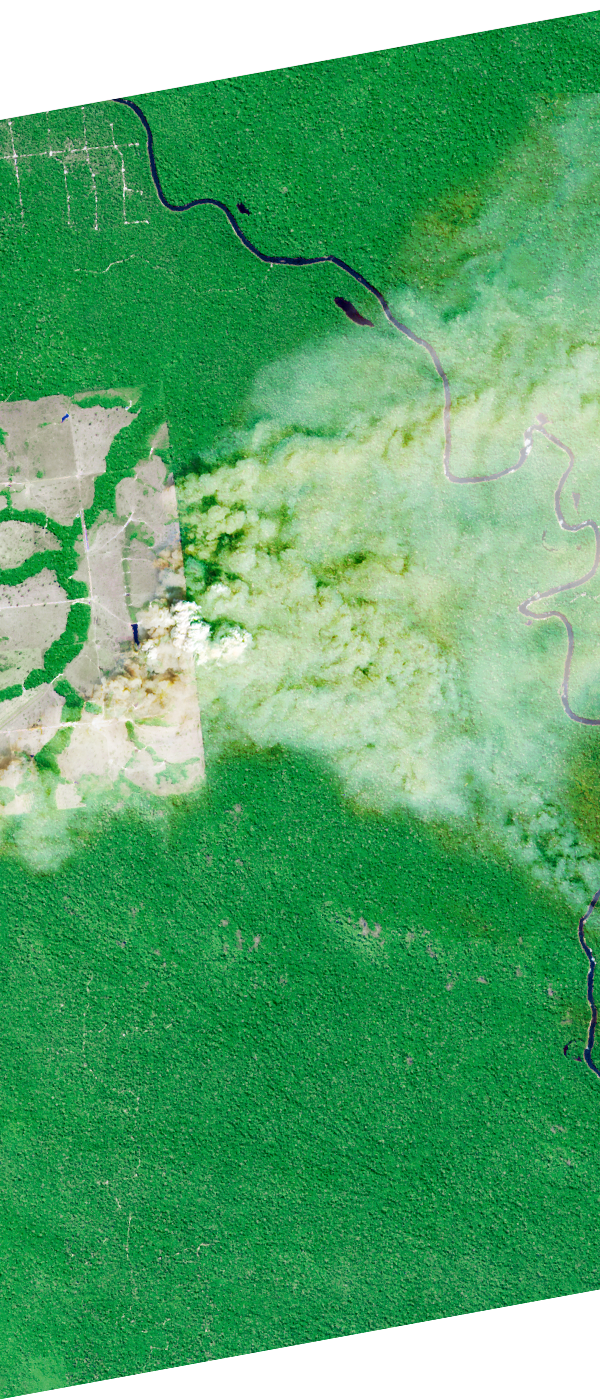

Public, government and business concern about global deforestation and biodiversity loss is sparking a growing wave of initiatives from the private sector. But are companies in Australia doing enough to protect forests?
The Wilderness Society has conducted a benchmark to understand how companies associated with deforestation risk commodities in Australia are addressing the issue. The focus is on the supply chains for commodities linked to deforestation1 in the country: timber, pulp and paper, beef and leather as well as bauxite. We assessed influential companies within these commodities on their publicly available policies and plans to address deforestation.
See the Deforestation Benchmark Overview for more information on the purpose of the assessment, the impact the production of these commodities is having on forests in Australia, as well as the benchmarking methodology.
1. Including the deforestation, degradation or conversion of primary forests, remnant forest, HCV and HCS areas as well as the conversion of natural ecosystems.
This document expresses the opinions of Wilderness Society Limited. It is based on each company’s publicly available policies and other relevant documents that were known and available to the authors as of 31 August 2023. This document does not give financial or legal advice.

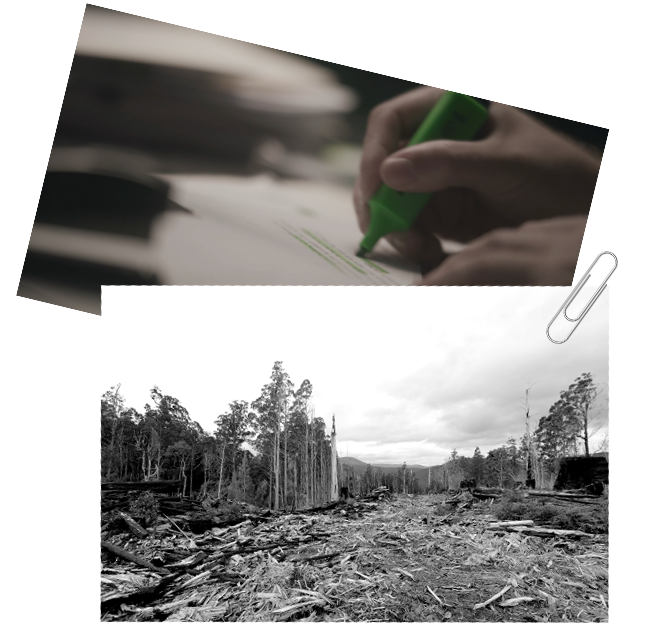
The benchmark found that only a very small proportion of the companies assessed currently have sufficient policies and procedures in place to rule out deforestation from their supply chains.
Corporate policies and commitments vary greatly among the roughly three dozen companies assessed in the benchmark. While some of these companies make no mention of the issue of deforestation, others have detailed public plans to ensure none of their activities result in deforestation
The second bulletin release “those who disguise” revealed: five companies that have general commitments on deforestation, but almost no information about how, when and where these commitments will be actioned. They offer little to no transparency on what they are doing, if anything, to begin to trace and verify their supply chains in Australia.
This bulletin reveals “those who avoid”: seven companies that express some concerns about biodiversity and forests, but fail to sufficiently address their own responsibility. To be credible, they should strengthen their commitments and make solid plans to address deforestation risk in their supply chains.

Introducing "those who avoid"
AI Topper is an Australian producer, processor and exporter of hides, skins and leather. It has been assessed for its leather supply chain.
Alcoa is a global American bauxite miner and manufacturer of aluminium products. It has been assessed for its bauxite supply chain.Coles is an Australian retailer with approximately 1,800 stores in Australia. It has been assessed for its pulp and paper and beef supply chains.
Midway is an Australian forestry manager, processor and exporter of wood fibre. It has been assessed for its pulp and paper supply chain.
Nippon Paper Group is a Japanese paper products manufacturer that has operated in Australia since 2009 through its subsidiary Opal. It has been assessed for its pulp and paper supply chain.
Pentarch is an agricultural and forestry company. Its operations include forestry management, timber processing and export. It has been assessed for its timber supply chain.
South32 is an Australian metals miner and manufacturer of aluminium products. It has been assessed for its bauxite supply chain.
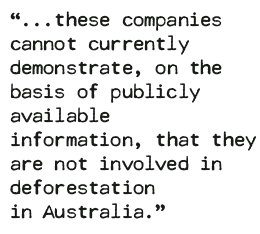
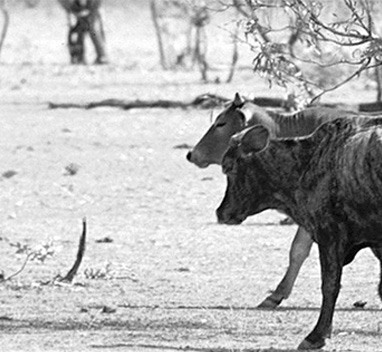
Ranking
The benchmark separates the general policy and commitments from the commodity-specific plans and information on their implementation (read the full methodology in the overview). All companies have a combined score across their general and commodity-specific commitments.
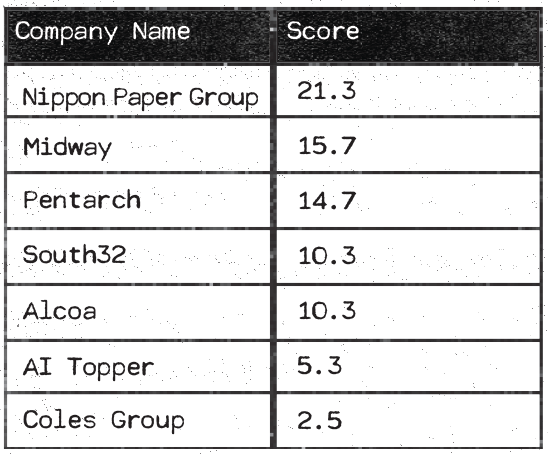
See Annex 1 - cohort scoring comparison
Scoring data is available upon request at [email protected]
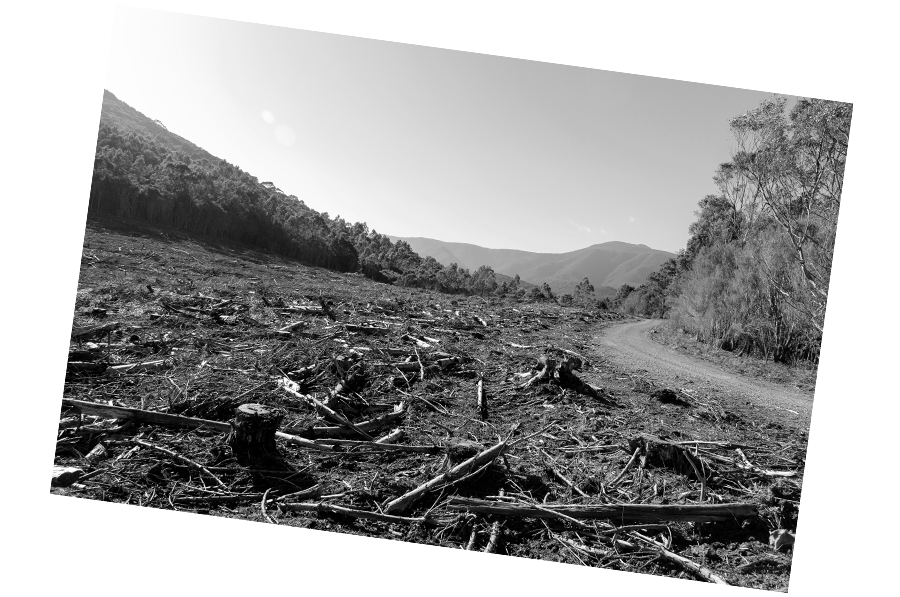
Insights and how to improve
The companies in this cohort stand out from the rest of the companies scored in this benchmark because while they do express a level of concern towards the degradation of the environment and forests, their policies are nowhere near strong enough to eliminate the risk of deforestation in their supply chains. Several of these companies have commitments to protect forests, but the scope and ambition of those is vastly inadequate. This means that their commitments are either limited (for example, aiming to protect old growth forests only), or vague (for example, committing to “the promotion of zero deforestation” or only eliminating the “significant” conversion of native forests).
Additionally, none of these companies state a specific target year by which they aim to achieve their commitments. The companies in this cohort generally express recognition for the need to protect forests, and state they source some credibly certified products. Some of these companies have tools like traceability systems, supplier requirements and guidelines in case of non-compliance with their commitments. The effectiveness of these tools for eliminating deforestation from their Australian supply chains is unclear, as these tools are potentially being used to support commitments that lack ambition in and of themselves.
None of the companies in this cohort have public implementation plans to eliminate deforestation from their Australian supply chains. Nor do they publicly communicate about adequate verification and monitoring systems. These companies are not publicly transparent about their supply chains and progress against their commitments.
To ensure their concerns about the environment and forests are credible, they should:
Set strong public commitments to eliminate deforestation from their supply chains with precise language, broad definitions of forests and deforestation and clear timelines.
Collaborate with other stakeholders to limit deforestation, including by joining credible global initiatives and supporting state and federal forest protection and regulations on deforestation.
Publish specific, time-bound implementation plans to remove deforestation from their supply chains for each commodity in Australia, including clear milestones and deforestation cutoff dates. Reporting against progress and setting up verification systems of their supply chains, as well as traceability systems must be transparent.
Analysis of individual scores
Nippon Paper Group has obtained a score of 21.3 / 100. The company does have a public commitment to protect forests, but it is limited: based on the wording, the commitment could be understood as an optional goal. It reads “The Group strives to use its raw materials according to the “Wood Resources Procurement Guidelines” below”. The company does state that the guidelines apply to its subsidiaries and clarifies which products it covers. In Australia, Nippon sources some FSC recycled products. However, Nippon doesn’t have a target date for this commitment. It also doesn’t appear to be part of any key global initiatives that have commitments to remove deforestation from supply chains. Importantly, no information was found on how the company intends to apply its commitment in Australia. No deforestation cut-off date was stated. While the company does say it is working to trace materials back to the forest, no further information was available on the system, when it would be implemented or how it would help remove deforestation from supply chains. Beyond PEFC certification and some illegal logging monitoring, publicly available information does not indicate the existence of adequate monitoring and verification systems to follow up on Nippon’s commitment in Australia. There is also a lack of transparent publicly available information regarding the company’s supply chains and its progress towards commitments. Nippon should turn its guidelines into real, strong commitments to remove deforestation from its supply chains by 2025, and set up proper implementation plans and verification systems to ensure the commitments are realised.
Midway Limited has scored 15.7 / 100. It has a similar commitment to “do everything reasonable to avoid” the use of certain sources of wood. Its commitment is limited in scope. Publicly available information shows Midway uses some FSC certification, and discloses its sourcing regions. However, no information was found on any commitment target date, membership of global initiatives, implementation plans to eliminate deforestation, verification systems, procedures in case of non-compliance, or supply chain transparency and progress reporting. Midway would benefit from ensuring its commitments are in line with current international best practice, with a stronger commitment to eliminate all deforestation from its Australian supply chains, a 2025 target date and transparent implementation plans with effective tools.
Pentarch has scored 14.7 / 100. It has a commitment to “only undertaking forest management that does not degrade or convert native forests” and states it will exclude significant biological diversity values from its activities. However, its commitment also mentions the “net gain” of biodiversity, and plans for offsets that aim to compensate for biodiversity loss from conversion. The company does disclose maps of its activities and uses both FSC and PEFC certification schemes. However, no implementation plan was found to eliminate deforestation from its supply chains. Pentarch should set a strong commitment that aims to eliminate all gross deforestation from its Australian supply chains (not just net), and set itself up to achieve those by publishing implementation plans, information about traceability efforts, verification systems, non-compliance procedures, supply chain disclosure and progress reporting.
South32 has scored 10.3 / 100. It has a limited commitment on forests: it states it has “committed to avoid exploring or mining in World Heritage Areas and to respect legally designated protected areas, whilst also delivering no net loss outcomes for all new projects and major expansions”. The company’s commitment is limited to offsetting and rehabilitating its impact on biodiversity, including forests. The company provides some information on its supply chain, disclosing the volumes of bauxite it produces. Based on publicly available information, the company is not committed to ending deforestation in its supply chain. Instead, it limits itself to “reasonable avoidance, mitigation and rehabilitation measures”, and uses offsets. No evidence of a commitment target date, specific implementation plan or monitoring system was found. South32 should not rely on rehabilitation and offsets as a substitute for eliminating deforestation. It should commit to eliminating all deforestation from its activities and set up public implementation plans and monitoring systems to do so.Alcoa has scored 10.3 / 100. It also follows avoidance, minimisation and rehabilitation measures rather than a strong commitment to end deforestation within its supply chains. Alcoa states it respects protected areas but only “where strict nature conservation is the management objective” and has committed “not to explore, mine or operate in World Heritage sites” or “old growth forest, gazetted national parks, nature conservation reserves, or other areas of high conservation value”. No commitment target, implementation plan or adequate verification system was found on deforestation. The company does provide information about the volume of its bauxite production in Australia. Similarly to South32, Alcoa should not rely on rehabilitation and as a substitute for eliminating deforestation from its supply chains. It should set a strong commitment, public implementation plans and monitoring systems.
AI Topper has obtained a score of 5.3 / 100. AI Topper does not have a commitment on eliminating deforestation. However, it is part of the Leather Working Group, a global initiative that aims to achieve deforestation and conversion-free leather by 2030. It is unclear whether AI Topper is endorsing this commitment as a result of its membership. While the company does state traceability to meatworks exists, no information was found on implementation plans, cutoff dates, any monitoring of deforestation risk within supply chains, transparency measures or progress reporting. AI Topper should set a strong public commitment to eliminate deforestation from its supply chains by 2025 and set public implementation plans to achieve it.
Coles Group has obtained a score of 2.5 / 100. It does not have any commitment on eliminating deforestation. Instead, it only states it is conducting an “environmental impact review of Coles Own Brand products”, which includes mapping potential deforestation in its supply chains. The company does source some FSC certified recycled products. No information was found about any potential implementation plans, verification systems, supplier compliance measures, traceability or transparency measures, or even the result of its impact review. No information was available on how the company addresses the risk of deforestation in its beef supply chains. Coles Group should catch up with international best practice by setting a public commitment to eliminate all deforestation from its supply chains, and creating implementation plans and tools to do so.
Download Bulletin #3 pdf
This document expresses the opinions of Wilderness Society Limited. It is based on each company’s publicly available policies and other relevant documents that were known and available to the authors as of 31 August 2023. This document does not give financial or legal advice.
The Wilderness Society acknowledges First Peoples across the continent as the traditional custodians of Country, over which sovereignty was never ceded. We pay our respects to Elders and Ancestors who have cared for Country through millennia and acknowledge the unbroken connections to culture and Country which continue to endure today.